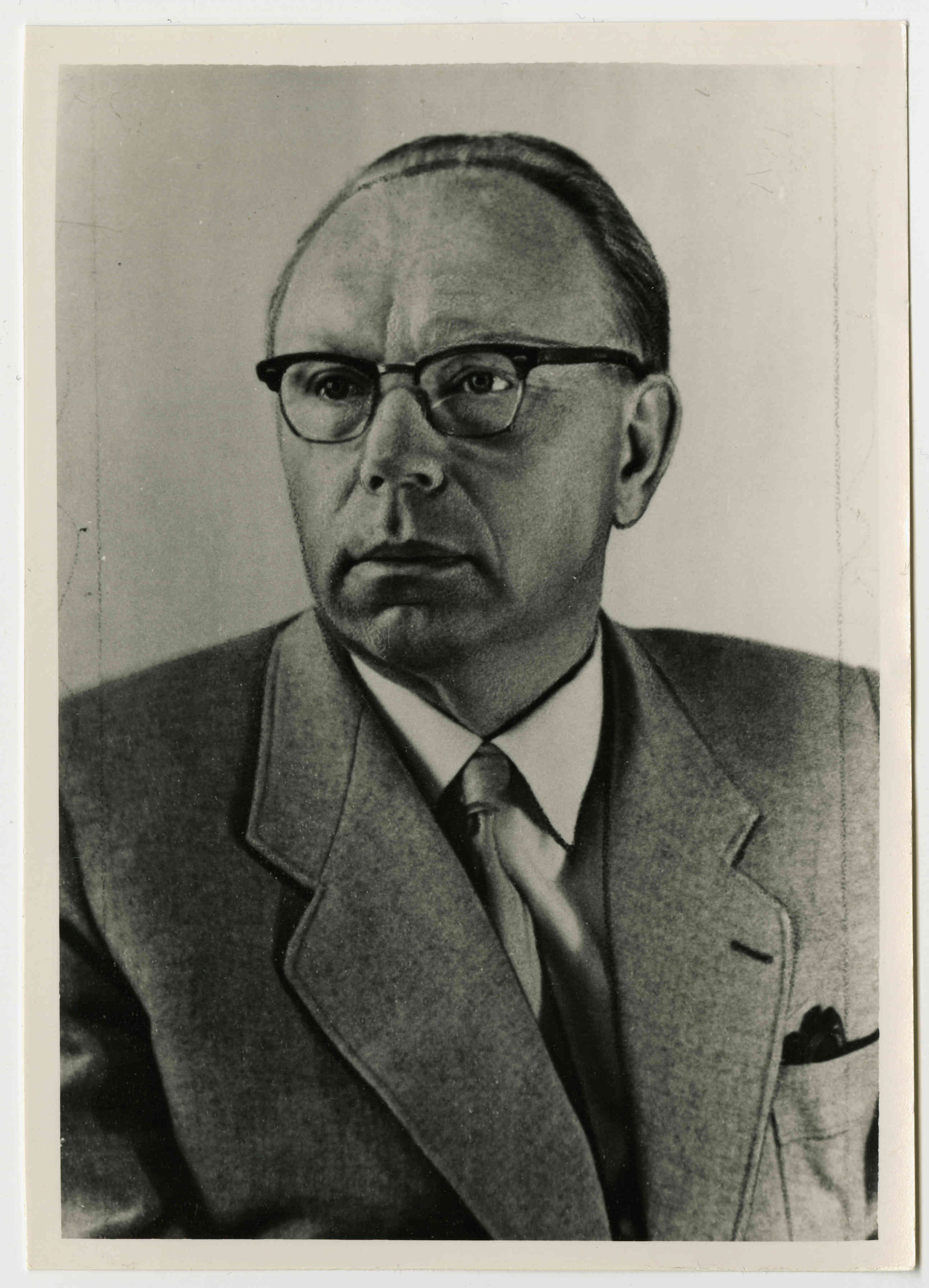
Hugo Angervaks
Hugo Angervaks (given name Eduard Päll, 15./2. X 1903-13. VI 1989) was a linguist and literary scholar, prose writer and a statesman of the Estonian SSR.
He was born in Koosa village, Tartu County and studied in Tartu. In 1918, he went to Petrograd and joined the Red Army. He settled in Soviet Russia. In 1929, he graduated from the Herzen State Pedagogical Institute in Leningrad. From 1931-1934, he was a postgraduate student in the language research institute in Leningrad (in general linguistics and Finno-Ugric languages). After the occupation of Estonia, Angervaks returned to Tallinn and occupied several political and executive positions, including from 1943-1947, the Propaganda Secretary of the ECP CC (Estonian Communist Party Central Committee); from 1948-1851, a member of the ECP CC; from 1947-1950, the Chairman of the Presidium of the Estonian SSR; from 1948-1950, the Vice Chairman of the Presidium of the Supreme Soviet. He led the Estonian language and literature department of the Tallinn Pedagogical Institute from 1950-1955; was the director of the language and literature institute of the Academy of Sciences of the Estonian SSR from 1955-1968; and the academic secretary of the social sciences department of the Academy of Sciences of the Estonian SSR from 1968-1973. He was a member of the Communist Party from 1920 and belonged to the Estonian Proletarian Writers Association from 1926. He was Candidate of Philology in 1955, the correspondent member of the Academy of Sciences of the Estonian SSR in 1961, Merited Scientist of the Estonian SSR in 1969. From 1947-1951, he was a deputy of the Presidium of the Estonian SSR; from 1946-1954, a deputy of the Supreme Soviet of the Soviet Union. He was decorated with several Soviet awards. He died in Tallinn and is buried at Metsakalmistu (‘Forest Cemetery’).
Angervaks’ first writings were published in Estonian magazines in Petrograd, his first books were the story collection Kuues lint (‘The Sixth Ribbon’, 1931) and Valitud vested (‘Selected Stories’, 1933). The more remarkable portion of his works was published in Soviet Estonia. His realistic writings are based in Soviet ideas. The novel Kelk soo peal (‘Sled in the Marsh’, 1969), which explores the inner world of the protagonist, a young worker, has more diverse characters. Angervaks’ poetry is also characterized by realism.
In addition to prose, he has also published language and literary works, e.g. he studied original Estonian-language writings published in the Soviet Union from 1920-1930, and authored several textbooks.
A. K. (Translated by A. S.)
Books in Estonian
Novels
Kelk soo peal. Tallinn: Eesti Raamat, 1969, 236 lk.
Must kajakas. Tallinn: Eesti Raamat, 1987, 204 lk.
Short stories
Kuues lint. Leningrad: Külvaja, 1931, 36 lk.
Siim Sepik, Valitud vested. Leningrad: Külvaja, 1933, 47 lk.
Hommik: sulejoonistusi Raeverest. Novellid. Tallinn: Eesti Riiklik Kirjastus,1959, 255 lk.
Ajaproov: jutustusi ja humoreske. Tallinn: Eesti Riiklik Kirjastus, 1957, 316 lk.
Muumia: humoreske. Tallinn: Eesti Riiklik Kirjastus, 1961, 182 lk.
Kaks tamme ja pihlakas: novellid. Tallinn: Eesti Raamat, 1973, 159 lk.
Helisevad avarused: novellid. Tallinn: Eesti Raamat, 1978, 176 lk.
Kuldnokkade aegu: jutustusi ja novelle. Tallinn: Eesti Raamat, 1980, 178 lk.
Poems
Vanad kased. Tallinn: Eesti Riiklik Kirjastus, 1960, 107 lk.
Inimese avastamine. Tallinn: Eesti Raamat, 1976, 136 lk.
Hiline rändaja: luuletused ja poeem. Tallinn: Eesti Raamat, 1983, 79 lk.
Literary studies
Eduard Päll, Eesti nõukogude kirjanduse noorusmailt. Tallinn: Eesti Raamat, 1973, 168 lk.
Miscellaneous
Töös ja võitluses: valimik artikleid ja sõnavõtte 1944-1947. Tallinn: Poliitiline Kirjandus, 1948, 268 lk.
Intelligentsi osa ühiskonna arengus. Tallinn: Poliitiline Kirjandus, 1949, 23 lk.



